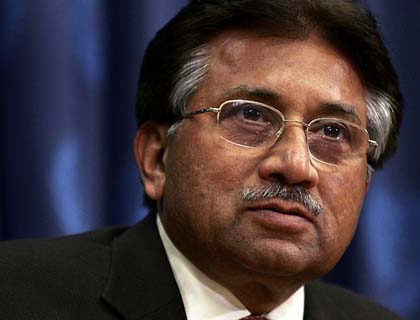Months ago a cheerful report decorated the headlines of Pakistani and international newspapers: the civil government successfully came to an end after serving its full term for the first time, an unprecedented issue in the political history of the country. All previously governments were whether unelected and came to power through military coup or toppled before serving their full terms. The civil government under the premiership of Asif Ali Zadari, the husband of former Prime Minister and hugely popular women, Benazir Bhuto, succeeded to serve its full term.
Analyses and comments followed the news was giving one impression that with all challenges and problems in the country, such unprecedented event heralded a better prospective for democracy. In other words, Pakistan has moved ahead toward democracy than the years before the commencement of outgoing government.
Now similar optimism flows out of the analysis about arrest of former military chief and President, Mr. Parvez Mushraff, who ended his four years-long self-imposed exile in order to play bigger role in the upcoming parliamentary election. He ruled the country from 1999 to
2008 after he took power by sacking ex-Prime Minister Mr. Nawaz Sharif who leads his political party Muslim League-Nawaz, the parted branch of Muslim League party that secured the independence of Pakistan after scuffling with Indian Congress Party. Now Mr. Nawaz is again a front runner for the upcoming election and has a grand chance to become the new prime minister.
Mr. Musharraf returned to the country in hope to challenge Nawaz Sharif, Asif Ali Zardari, Emran Khan, sportsman turned politician, and other potential candidates for de-facto supreme political position. But on Saturday, He was held for two weeks until the next hearing in a case related to his 2007 decision to sack and detain several judges. After the judge's order on Saturday, Islamabad's administration declared that Musharraf's lavish country residence could serve as a jail, meaning the ex-president could be held there under house arrest.
He appeared before the anti-terrorism court amid tight security, as hundreds of lawyers opposing him scuffled with security personnel and shouted slogans against the former military ruler. “Go Musharraf Go and whosoever is a friend of Musharraf is a traitor”, shouted countless people out of the court.
Spokesman for Musharraf’s All Pakistan Muslim League party told reporters, “Our lawyers denied the allegation that General Musharraf sacked judges and kept them and their families under house arrest for six months. It is absolutely untrue”. “We had requested the court not to send General Musharraf on judicial remand, so that we can go to higher courts for relief”.
According to the ruling he should have been sent to prison but due to security reason he has been allowed to return to his farmhouse, saving him the hardships of a Pakistani prison where police said he would face security threats.
After his arrest amidst huge concern, similar optimism can be reflected in articles and analysis from the country as occurred after the successful completion of first civil government’s term.
Many call his arrest, which is the first of its kind that military officials be convicted in a court that also in anti-terrorism court, as success for democracy. In other words, the move of judiciary
reflects the power of this pillar of power that can even convict such a powerful individual whose conviction would have been a nightmarish illusion only four years ago.
But is such optimism realistic? I hope it was so as they are depicting in their analyses or fantasizing about it in their sanctum of functional democracy in their country, but I do not.
Whatever happens to Parvez Musharraf whether he gets convicted of serving years behind bars or be released to go back where he came from, either would support democracy and democratic establishment.
If the court ruling happened in a country other than Pakistan, it could be interpreted as move forward but I fear here it would be repulsive. Perhaps, the problem lies with the interpretation of democracy. Democracy is not all about elections and establishment of governments that fail to protect its leaders.
First of all, it should be noticed that the assassination of former Prime Minister, Benazir Bhutto largely helped the Pakistan People’s Party to rise on power as happened with the Rajiv Ghandi in
India. It is not clear what would have happened if Benazir Bhutto was alive? Was the President Musharraf ready to hand power to her or not? Her death gained the PPP huge sympathy and similarly mounted Pressure on government of Musharraf that made him leave the country.
However, the government could serve its full term but largely limped in domestic and political and economic spheres. The cycle of sectarian violence is terribly increasing to alarming level. Minorities are targeted while the government failed to protect them. Just during few months of 2013, more than four hundred Hazaras were killed in Quetta Pakistan while the Pakistani government failed to protect them as citizen of the country.
Responding to a journalist, the then governor of Baluchistan openly said that the only thing he could do for Hazara community was sending trucks of tissue paper to wipe out their tears!
So considering that whether rulers served full term or a strong person appeared in the court or not can be devious. Moreover, President Musharraf should not be considered the same former military general.
He ruled the country and finally exiled which have tremendously weakened his past strong military ties among the military establishment. In addition, presently secular parties are under huge restrictions for election campaign. Pluralism of all kind which is the very principle of democracy is changing to unfamiliar thing or deemed as foreign product. Same is the case with human rights, women rights, right to protection and etc. If Pakistani rulers want to have a bright future, instead of revenging Parvez Musharraf, serious combat should start against radicalism and extremism which is increasingly showing bolder presence on political stage.

